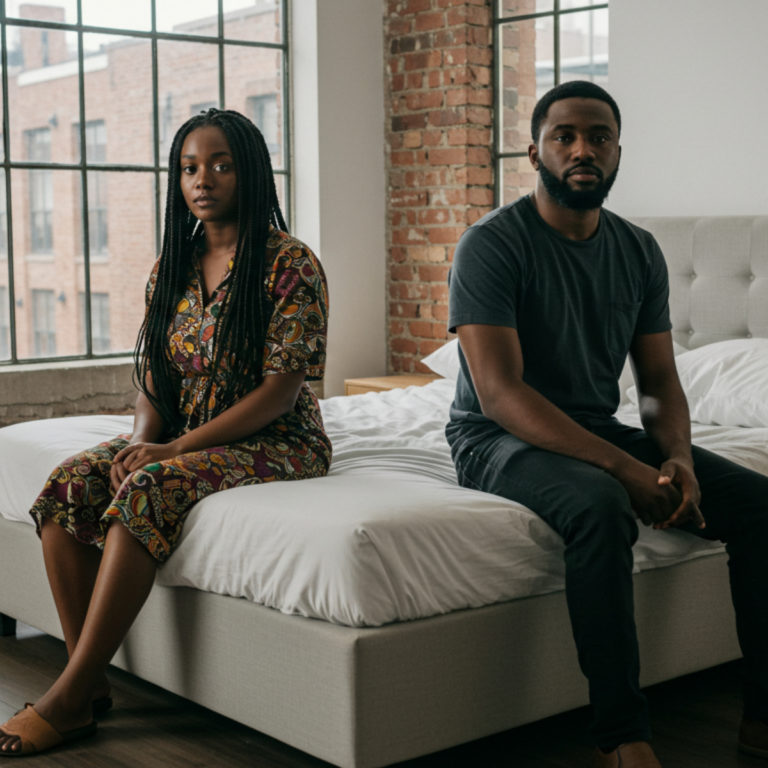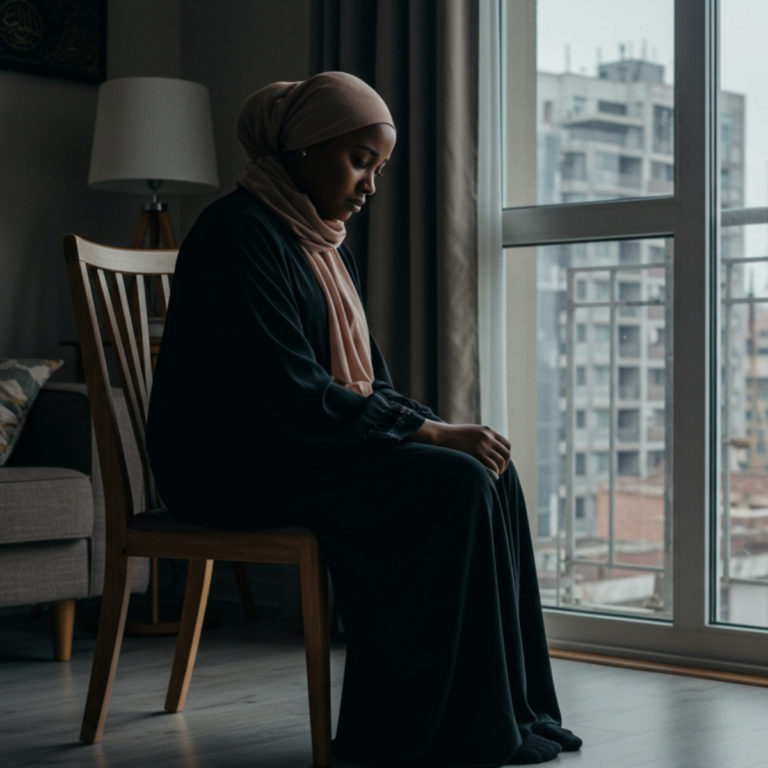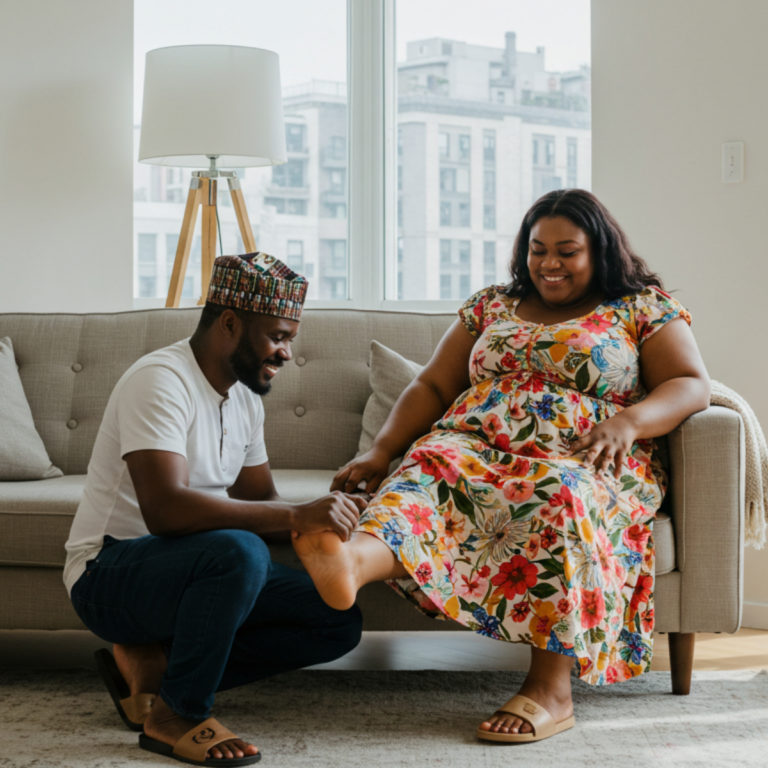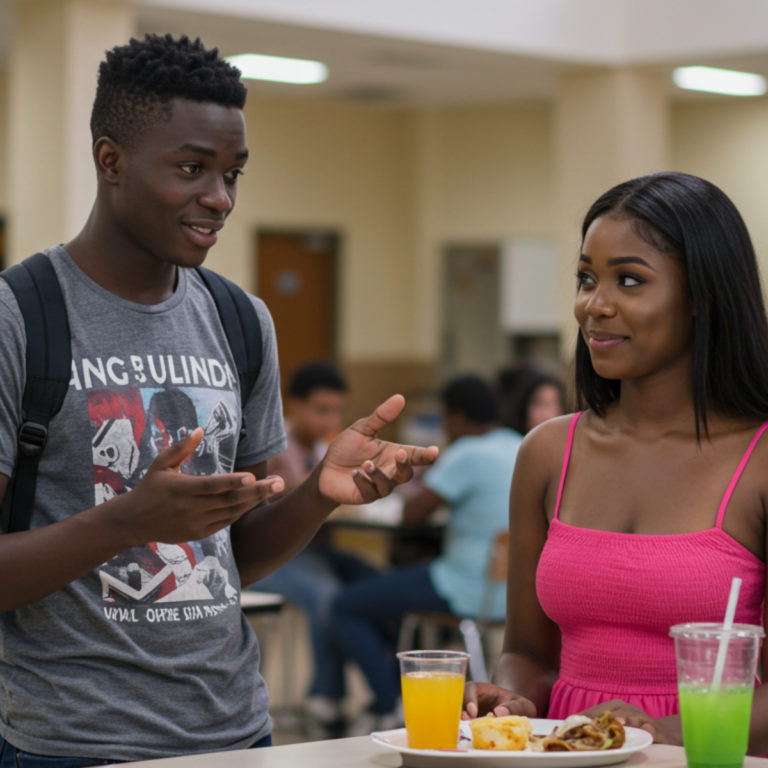Love Life is a Zikoko weekly series about love, relationships, situationships, entanglements and everything in between.
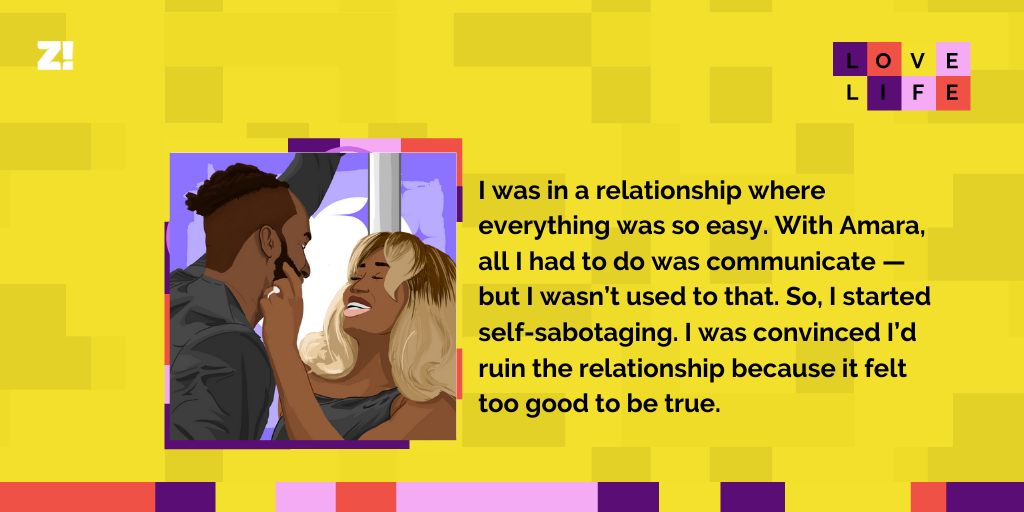
What’s your earliest memory of each other?
Amara: She came to my department with a mutual friend in 2017. I thought she stood out because of how she dressed. I honestly can’t remember what she was wearing anymore, but it’s what I took away from that first introduction. In my head, I was like, “Oh wow, this person looks interesting”.
The next time we met was at a study session in the BQ of a friend’s then-boyfriend.
Eseosa: The first time I noticed him was at the BQ. I wasn’t part of the study session because I was in a different department. But I was almost always with my friends during my free time, which was a lot because I didn’t really care about school. Anyway, my friend had a natural hair business and I helped her with it. That day, we had a few errands to run, and she needed to pick something from the BQ where they were having the study session.
We didn’t stay long, but that was the first day I properly noticed him, even though we didn’t talk.
What did you notice about him, Eseosa?
Eseosa: I mean, I thought, “Oh wow, this boy is fine,” and that was it.
So what happened next?
Eseosa: The years passed. At least three years, if I’m correct.
Amara: Yes.
Eseosa: At the time, I was still at university and was going through a lot. He and our mutual friend attended the same church. One day, our mutual friend came to me and said, “You’re following me to church.” I got to the church, and he was there. I was like, “This fine boy is here again.” I hadn’t developed a crush on him then; that didn’t happen until later.
Oh
Eseosa: Thanks to my friend, I started attending their church, and we were always together. The church was small and cosy and served coffee and biscuits after service. People didn’t leave on time because the atmosphere was great for conversations, plus we had a friend who always drove us back. So, it was a thing where, after church, we all stayed back until everyone was ready to leave. And that was how we started talking.
When was your first conversation?
Eseosa: We’d been assigned as each other’s prayer partners. You and your partner had to spend the week praying and reporting how it went to our pastor. My faith was watery, but Amara is someone who likes to finish things. One Friday, he reached out to me and said, “Guy, we have to do this prayer thing,” and then he came to my hostel afterwards.
Everywhere was crowded with people who came to see their lovers that night. While he was trying to find chairs for us, I sat on the floor. He eventually joined me and we got into a conversation.
We yapped about different things and only remembered to pray afterwards. We became friendly after that night, and I developed a strong crush on him.
Amara: That night, we spoke about everything: her faith, our praying habits, and our individual views on aspects of spiritual life. All of my discoveries about who she was at the fundamental level happened during that conversation.
However, what struck me the most was how she chose to sit on the floor. I have female friends, and I’ve come to realise that for most women, it takes a long time before they can become their most authentic selves around a guy, which is normal. I expected that to be the natural progression of whatever we had going on, so I was shocked when she sat on the floor. I still admire that about her to date.
Anyway, it was from the conversation that night that we became cordial. We spent the next year and a few months being cool toward each other. But we were still not “friends friends”.
Hmmm. So, when did things progress to the next level?
Amara: It was after I got out of a relationship in September 2020.
I’ve always avoided extended conversations with the opposite sex when I’m in a relationship; it’s a sort of boundary that I put in place to make sure I don’t leave room for cheating. I don’t expressly say it; I just do it.
I think she noticed that I’d relaxed my boundaries. I’d started talking to her and other women. I should be clear: I wasn’t looking for a new relationship. I was at a point where I’d let down my guard and started enjoying conversations with other women, without worrying about crossing any personal boundaries tied to an existing relationship.
One day, a conversation came up and she wanted to find out who I was interested in, seeing that I’d become single. I was like, “ Yeah, I cannot tell you that.” For me, it was partly because I wasn’t ready to build anything.
But Eseosa knows how to pester you; she’s like a bug. Eventually, she said there was someone she also liked, but she would only share the details if I revealed who I liked. It was after that I told her she was the one.
I think she was in shock for a few minutes before revealing she liked me.
Eseosa: His ex used to attend the same church as Amara and I; you could say we had a budding friendship. We were also in the same church unit, and it only made sense to befriend people you work with.
Anyway, I noticed I wasn’t really seeing his ex anymore around COVID. I reached out to her, and she said she was fine, but she didn’t tell me they’d broken up. I also noticed that he casually mentioned that she was fine when I asked him about her, but I wasn’t fine with that answer, so I pressed on until he told me they’d broken up.
I was bummed by the news because I actually liked them together, but it started to make sense why he’d become more lax. However, there were two other girls that I thought he had his eyes for. I thought if he was going to be interested in anyone, it would be with one of these people.
Then, two months later, the conversation about who we liked happened. I truly didn’t expect he would say my name because I assumed he thought of us as just friends. I didn’t think he wanted me in that way.
That’s why I wanted him to say a name first. So if he didn’t mention my name, I’d wiggle my way of telling him mine. Imagine telling him I like him and finding out he likes someone else.
If you want to share your own Love Life story, fill out this form.
Fair. What did you guys do with this “mutual likeness”?
Eseosa: We sat on it for a bit. It was like, “Now that we are both aware, what do we do with this information?”
Amara: We were supposed to wait between three to six months before dating.
Why?
Amara: Our pastor set a dating rule for young people in the church to achieve two goals: to ensure that people have properly processed their past relationships (before getting into a new one) and that the person you’re starting a new relationship with doesn’t feel like a rebound.
A challenge I didn’t notice, however, was the willingness of the new person you want to date to wait for you. So, I communicated this with my pastor, who waived the rule because my ex had stopped attending church.
Eseosa: I was ready for a relationship, and I’m not one to talk to one person exclusively. I was talking to him, enjoying the conversation, but there was another person I’d gone on two dates with.
I like to know the script. If I say I like you and you say it back, what are we doing with it? I don’t just “go with the flow”. So when he told me about the rule and timeline, I said it was fine, but “don’t expect me to wait for you.”
Amara: Once I was sure that we both knew what we wanted, I asked her to be my girlfriend. This happened in November 2020, two months after my previous relationship ended.
Sweet. What were the early days like?
Amara: They were amazing. I was discovering this person who is very true to herself and has a number of talents. She draws, and sings, and because of that, we got to do a lot of goofy things on video calls. Plus, she’s also the funny one in the relationship.
Eseosa: It was like love in Tokyo.
We had just come out of a pandemic and graduated from school, so we had a lot of time on our hands. We fell asleep together during phone calls and did all the mushy things you’d roll your eyes at on social media. But those days were also triggering, not in a bad way.
Please, explain.
Eseosa: When we started dating, I was in a headspace where I was carrying some emotional baggage — personal troubles and childhood trauma.
These things had held me back in previous romantic relationships, but I was getting better and making progress. But then, do you know how people say you feel lighter when you shed bad stuff? They never mention the need to fill the vacuum you’ve created. Now, because you’ve been used to so much negativity, you want to replace it with positivity, but you don’t even know what that looks like. It’s a very weird space that triggered me a lot.
I was in a relationship where everything was so easy. With Amara, all I had to do was communicate — but I wasn’t used to that. So, I started self-sabotaging. I was convinced I’d ruin the relationship because it felt too good to be true. On some days, I’d say I didn’t want to talk, and he’d understood.
But at some point, he called and said, “We can’t keep doing this, what really is the problem?” I told him I was scared, and when he asked if I wanted us to end, I said “No”. Eventually, I had to learn to stop being scared.
Again, the early days were great; I just never expected to be triggered by how good they were.
Amara: I acknowledge that these things happened, but they weren’t significant enough for them to be the defining memories of our relationship’s early days. From my POV, there were a lot more positives than negatives.
I should also add that one factor instrumental to the success of the first three years of our relationship was the counselling sessions with our pastor.
Eseosa: It was pretty much marriage counselling.
Wait, you attended marriage counselling while dating?
Eseosa: Our church’s structure is that once a relationship has been steady for three to six months, you present yourself to the church authorities for counselling. Couples who attend talk about a range of topics and possible scenarios that can arise in the home. The idea was that if you’re dating, it’s because you’re both working towards marriage. And the church was right — four years later, we decided to get married.
Amara: Anyway, she’d occasionally drag me to a meeting with our pastor and table a matter she felt we needed to address, especially if I had a problematic perspective about the issue.
Having a neutral third party whom we both respect offer advice and their perspective helped us see things from a different lens. It helped that we respected them, which made us consider their suggestions and figure out what works for us.
Another thing that helped was a review system we painstakingly used to find out what we’d done wrong and what we could do better.
Interesting. So, what was your first major fight about?
Eseosa: I can never forget because I broke up with him right after.
Ah.
Eseosa: So, we were both in the same unit at church, and I was in charge of outfits. Basically, I decided how everyone appeared on Sundays.
Some people couldn’t get their stuff together and I only found out at rehearsals on Saturday. While I was having a conversation with two people, someone barged in and was really rude to me. I didn’t know what warranted the rudeness, but I also had to excuse myself around that time to use the restroom.
When I got back, Amara and other church members already had a roundtable discussion about how I handled the situation. My grouse with Amara was, we were both leaders in the group, and I felt he could have levelled with me without the entire roundtable discussion. That felt like a pile on.
I was angrier at the fact that I tried to communicate how the person had rudely approached me while he stood watch, and he tried to dismiss my feelings. He got defensive and couldn’t see from my point of view that I was the aggrieved person. The whole thing dragged on, and he tried to resolve it, but I didn’t like how he went about it. I texted him that night saying, “Omo, don’t do this to your next girlfriend.” In my mind, I’d clocked out of the relationship.
I’m curious, how did you take the break up, Amara?
Amara: I didn’t know she broke up with me. I just read her text as a message and didn’t interpret it as deeply as she meant it.
The thing with letting go is that I don’t remember much details, but I think that’s been our biggest fight so far. One thing that stood out from the event was that it was the one time I saw that my pastor’s ability to help me see things differently helped to keep our relationship going.
How did this experience help you manage conflicts going forward?
Amara: We now have a list of guiding rules that we bump up from time to time in light of new information, research or feedback.
One that stands out is, “Don’t bring up your issues when I’m sharing how I feel about something you’ve done”. You help to validate my grouse with you first, and you can talk about yours later.
Eseosa: The most important thing is what he mentioned.
Sometimes, we get defensive. We don’t get it right all the time, but we’re both aware of these guiding principles. Our first instinct as humans is to defend ourselves or justify what we’ve done, but these principles help us navigate the tide.
Another rule is, we must always reach a resolution. No matter how small, we can’t move forward until we resolve it.
You mentioned you’re getting married earlier. When did you know y’all were headed there, Eseosa?
Eseosa: I’m a very impulsive person.
A lot of big decisions I’ve made were in the moment. Thankfully I’ve not made any horrible big decisions in the past couple of years. But the “I want to marry this person” decision was very logical.
I was never marriage hungry; I was fine whether it happened or not. However, with Amara, the whole experience is positive. He gives me room to grow, holds me accountable, calls me out on my bullshit, and he’s my safe space.
So, it was like, if I’m going to get married at this moment, this is the person.
What about you, Amara?
Amara: I’ll say the defining moment for me was when I asked myself, “What is out there that I don’t have?” And the more I examined our relationship, the more I realised that I had everything I was looking for.
How would you say the relationship has changed you?
Amara: I used to consider myself a very patient person but relationships require a different type of patience.
There are moments in our relationship when one of us is struggling because of something the other person is doing, and you know you just have to be patient. I’ll admit, those times have demanded more from me than I ever thought I could give.
Eventually, it becomes like building a patience muscle. The more opportunities you get to be patient, the more you get better at it. I’m still learning to pause and delay my reactions to think of an outcome we’re both comfortable with.
Eseosa: I’ve learnt to be kinder to myself.
I used to be conflict-avoidant, but I’m in a relationship with someone who’s confrontational. During the early days, I’d tell him he can’t demand a response when I’m clearly agitated; that action in itself makes me breathless, almost like I’ll have a panic attack.
So, there he was learning to be patient with me, and I, on the other hand, had to get comfortable with having hard conversations. I had to accept that these conversations were necessary because you’re trying to make the relationship work.
I’ve also learnt to become comfortable about talking about my feelings. I’m very emotional but don’t like to talk about feelings because I’m used to being misunderstood. But I had to trust that if this person believes me when I say I love them, I’m obligated to share my feelings and emotions with them; that’s how they’ll feel like a part of my life.
I’ve also become a lot more patient. Amara is patient. If I can’t understand it, I dismiss it. But I’ve had to come to the headspace of being more patient with people. Basically being kinder to myself so I can be kinder to others.
How would you rate your love life?
Amara: Honestly, 10. If anyone wants to rate it lower, they’ll have to convince me where the minus one is coming from.
One of the perks of a relationship that has the ability to be everything you want it to be — your safe space, your baby, something you consider an asset — is that the relationship grows because both parties continue to grow and invest in themselves. That’s a 10/10 relationship for me.
Esosa: I’ll also say 10. I like that we’ve continued to grow over the years, and we’ve gotten to a place of understanding conflict by recognising each other’s triggers, and helping each other to overcome those triggers.
Read this next: I’m 11 Years Younger and Pregnant at 20

